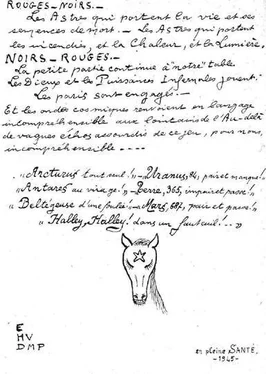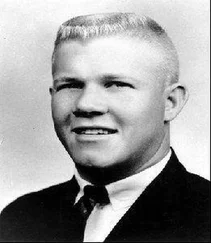35.
THE VERDICT
PETIOT IS NOT A MURDERER.
—René Floriot
AS the sixteenth and final day of the trial opened at one o’clock on Thursday, April 4, socialites, actors, athletes, dignitaries, and many other spectators once again squeezed together in the crowded courtroom, as Pierre Scize of Le Figaro said, like “herrings in a cask.” It was estimated to be the largest attendance at that time in the history of the Cour d’assises de la Seine.
Petiot, wearing the same gray suit and purple bow tie that he had on the first day of the trial, appeared confident as he scanned the gallery for Georgette, Gérard, and Maurice, all of them there as always. Dupin resumed his summary of the prosecution’s case. Before he could launch into the bulk of his argument, however, there was a disruption in the audience. A woman or perhaps two women had fainted. People scrambled to help, and when the guards intervened, they also met resistance from spectators who refused to abandon hard-won seats. Président Leser seemed confused about what to do. The trial looked like it would end, as the correspondent for Libé-Soir put it, “in a scandalous buffoonery.” Leser suspended proceedings at one forty-five.
Twenty-five minutes later, Dupin returned to his summary, reminding the court of the series of letters and postcards purportedly sent by victims after their disappearance. In each case, the content was similar, sometimes using almost identical language and word choices infrequently employed by the victim. Each time, too, the alleged writer signed his or her full name, even to a husband, a wife, or a lover.
Dupin classified Petiot’s victims into three groups: Jews hoping to escape the Occupation; gangsters and their mistresses; and a final category of patients who in some way threatened to put his medical practice in jeopardy. The latter group was murdered to prevent them from testifying about his activities. The gangsters and their mistresses were killed for their wealth, and if any of them belonged to the Gestapo, Petiot did not know it at the time and only took advantage of the fact afterward. As for Petiot’s calling the first group Gestapo agents and collaborators, this was a travesty. He had robbed and murdered Jews fleeing for their lives.
Petiot’s claims that the human remains had been planted were preposterous. The bodies at rue Le Sueur had been worked on by a skilled surgeon. The patterns of dismemberment corresponded to the pieces that had washed up in the Seine between the spring of 1942 and January 1943. Petiot admitted sixty-three “executions,” or liquidations as he called them, and Dupin reminded the court that there had probably been many more. He read a list of the twenty-seven people whom the state accused Petiot of murdering.
“No, Petiot, we will not allow anyone to desecrate the word ‘Resistance’ any longer,” Dupin said. “No deception, Petiot. The hour of justice has sounded.”
As soon as Dupin had uttered the words, Petiot stood and said, “Signed, the Procureur of the Vichy Régime.” The defendant held up a drawing he had been sketching during the closing statement. It was a caricature of the prosecutor that elicited laughter from the audience.
“Petiot, the role of judge does not suit you,” Dupin said.
“Nor you!”
The prosecutor, known for his reluctance to utter the words “death penalty,” usually resorted to some circuitous way of calling for capital punishment. For several days now, journalists and commentators had enjoyed a parlor game of guessing the phrase Dupin would use. After a final reminder that psychiatric evaluations had confirmed the defendant’s sanity and a claim that the death penalty had never seemed an “absolute necessity” more than now, Dupin was ready: “Let Justice be done and let us see Petiot soon join his victims.” This was not a popular phrase among the families of the victims.
AT three o’clock that afternoon, Président Leser motioned for Floriot to begin the final plea of the defense. As customary before beginning his argument, Floriot had downed a single glass of champagne—later this day too, for the first time, he would drink a second one. Floriot approached the task ahead, as Pierre Scize put it, with “the pleasure of a hunting dog running a hare,” a good comparison for the avid huntsman. Like many of the civil attorneys on the previous days, Floriot began by promising to be brief and deal strictly in known facts. His “short” summation would fill 339 typewritten pages and be one of the highlights of the trial.
Floriot confronted the prosecution head-on regarding the murder charges. The press had grossly distorted the facts, presenting the defendant as a “monster, an assassin, a thief, and perhaps even a sadist.” The Occupation-controlled press systematically suppressed evidence of Petiot’s work for France, embellishing instead his reputation as a terrorist and torturer. Never once was Petiot’s arrest by the Gestapo mentioned. His client’s image had been ruined.
The biases and mistakes in the media, moreover, were compounded by the inadequacies of the police investigation. Originally, Floriot said, the French police had wanted to accuse Petiot of one hundred murders, but with time, the number of victims had been steadily dropping as investigators discovered that he simply could not have killed them. In some cases, the real murderer was found; in other cases, the victim was discovered to be alive or to have been deported during the war. Sometimes, too, the victim had disappeared while Petiot was locked up at Fresnes. In the end, Floriot continued, the police were left with twenty-seven charges.
To secure conviction, detectives had searched for any piece of evidence that could be used against Floriot’s client, while also ignoring the positive testimonies found along the way. Citing the statement of Inspector Poirier, Floriot noted that the French police had interviewed two thousand of Petiot’s clients and found that they had said overwhelmingly positive things about Petiot. The prosecution’s statement had not reflected this reality.
Floriot retold Petiot’s background from his perspective. A volunteer infantryman in World War I and a veteran wounded in battle and honorably discharged with 50 and eventually 100 percent disability, Petiot had proceeded to study medicine at the University of Paris. He had written a dissertation that earned high marks and then established his own medical practice in Villeneuve-sur-Yonne. Repeatedly his patients had testified about the quality of Petiot’s work as a physician and his achievements as mayor. Then, after surviving the personal attacks from enemies who plotted his downfall, Petiot had moved to Paris and rebuilt his medical practice. All the while, he had remained a devoted husband and father. Like the police and prosecution statement Floriot just criticized, Floriot’s was a blatantly one-sided portrait full of contradictions and omissions.
The same emphasis on service beyond the call of duty persuaded Petiot to throw his lot behind the Resistance—and what really, Floriot asked, was the Resistance? Was it necessary or sufficient to join an official organization? Shouldn’t one also consider the importance of deeply held convictions?
Like it or not, Floriot argued, Petiot was a Resistant. Witnesses had confirmed his strong anti-German stance, and indeed there was not a single instance in the dossier that could show anything remotely pro-German. The advocate dwelled on how Petiot had provided false certificates for Frenchmen to avoid the German labor camps, or furnished prescriptions for drugs to make them sick on the day of the physical examination. Petiot had expanded his Resistance activities by working with Fly-Tox; Resistance fighters who knew him well, such as Lieutenant Richard Héritier, had no doubt about his Resistance past. Nor had the Gestapo, Floriot argued, reminding the jury of his client’s almost eight months of torture and imprisonment.
Читать дальше












